Past Rostovtzeff Lectures
2024: Timber, textile, tax and trade: economy and society in early Hellenistic Ionia
John Ma, Professor of Classics, Columbia University
2023: Empire’s Law: The Roman State in the Second Century BCE
Clifford Ando, David B. and Clara E. Stern Distinguished Service Professor, University of Chicago
2020: The other caravan cities: transport, capital, and inequality in the Egyptian oases.
Roger Bagnall, NYU
Read more about Professor Bagnall here: https://isaw.nyu.edu/people/faculty/emeritus-faculty/rbagnall.
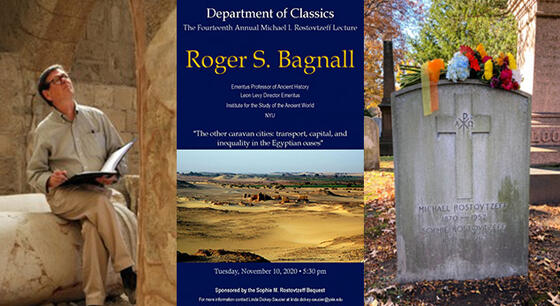
2019: Reflecting Rostovtzeff’s Caravan Cities: Petra as Pattern
Susan E. Alcock, Interim Provost and Vice Chancellor for Academic Affairs, University of Michigan-Flint. Department of Classical Studies, Uinversity of Michigan-Ann Arbor.
2018 Is there a “pre” to Mediterranean history?
Cyprian Broodbank, Cambridge University
2017 Did the Romans Have a Future?
Brent Shaw, Andrew Fleming West Professor in Classics, Princeton University
2016 The Twelve Caesars: Fictions and Fakes, Meanings and Misunderstandings from the Renaissance to Now.
Mary Beard, University of Cambridge
There will be a symposium on Beard’s talk on the following day, Friday, November 11, from 9 till noon, in Phelps Hall. Speakers include Michael Koortbojian (Princeton), Paula E. Findlen (Stanford), Stephen Campbell (JHU), Patricia Rubin (NYU), and Noel Lenski (Yale).
Mary Beard is Professor of Classics at Cambridge University and Fellow of Newnham College. She is also Classics editor of the Times Literary Supplement. Her recent research is focussed on the culture of Roman display, Roman color, paradigms of power in the Roman empire. For more and a list of publications: http://www.classics.cam.ac.uk/directory/mary-beard
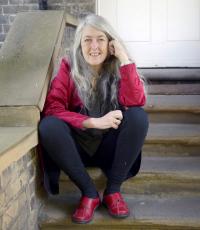
Mary Beard is one of Britain’s best-known Classicists — a distinguished Professor of Classics at the University of Cambridge, and Fellow of Newnham College, where she has taught for the last 30 years. She has written numerous books on the Ancient World, including the 2008 Wolfson Prize-winner, Pompeii: The Life of a Roman Town which portrays a vivid account of life in Pompeii in all its aspects from food to sex to politics. Previous books include The Roman Triumph, Classical Art from Greece to Rome and books on the Parthenon and the Colosseum. Her interests range from the social and cultural life of Ancient Greece and Rome to the Victorian understanding of antiquity. Her latest book& SPQR – A History of Ancient Rome was published in 2015 to critical and popular acclaim.
In addition, Mary is Classics editor of the Times Literary Supplement and writes an engaging blog, A Don’s Life, selections of which has been published in book form. In 2013 Confronting the Classics, was published, a collection of essays and reviews that Mary has written over the last 20 years for the Times Literary Supplement, The London Review of Books and the New York Review of Books.
Mary has been invited to deliver various prestigious lecture series. In 2008 Mary was visiting Sather Professor at the University of California, Berkeley, where she gave the Sather lectures on Roman laughter (A book, Laughter in Ancient Rome, based on the lectures has recently published by the University of California Press). In 2011 Mary delivered the Mellon Lectures at the National Art Gallery, Washington on the imagery of the Caesars. Mary’s academic achievement was acknowledged, in 2010, by the British Academy which elected her as a Fellow and in October 2011 Mary was inducted into the American Academy of Arts and Sciences as a Foreign Honorary Member. In 2012 she was also elected as an International Member of the American Philosophical Society. In the Queen’s New Year’s Honours list for 2013, Mary was awarded an OBE for services to Classical scholarship. In 2014 The Royal Academy elected Mary as Professor of Ancient Literature, an honorary position first instituted in 1770 and most recently in 2016 Mary was awarded the prestigious Spanish prize, The Princess of Asturias Award for Social Sciences.
Mary is a regular broadcaster and commentator on radio and television, on programmes such as BBC Radio 4’s In Our Time, and has presented television documentaries on Pompeii and Caligula as well as the highly-acclaimed TV series, Meet the Romans and the most recent BBC series, Rome – Empire without Limit.
2015 In the Land of the Cleruchs: Soldiers and their Lots from Athens to Alexandria.
Alain Bresson, University of Chicago.
2014 “Sold to Sin through origo: Augustine of Hippo on the Slave-trade”
Susanna Elm, University of California, Berkeley
In 427 or 428, Augustine, bishop of Hippo Regius in North Africa, wrote a letter to his friend and fellow bishop Alypius, a highly trained legal expert at that moment on his way to the imperial court in Ravenna. Augustine’s letter, followed by a second one to a local legal expert, was prompted by the recent mass-enslavement of persons Augustine identifies as free Roman provincials to be sold, from Hippo, to provinces overseas. Members of his church had intervened and set 120 of those captured free. However, these persons were not a homogeneous group.
They included “true” slaves; children sold, contrary to Roman law, in perpetual servitude; the wife of a colonus, a tenant of the church at Hippo; and a notarius of one of Augustine’s churches. In fact, as I will argue, Augustine’s letters were prompted not so much by the capture of these persons, but by issues of personal status, neither slave nor free, brought to the fore as a result of these raids. Using the complex issues of personal status these letters reveal, namely the existence of a grey area between freedom and slavery, the lecture then addresses the question whether and if so to what degree such social and economic realities shaped Augustine’s theological notions of freedom and bondage. Might Augustine’s concept of original sin, his nuanced intellectual and theological proposition about human nature and divine will also be understood as a form of theological reasoning grounded in the social, political, and legal practices of the late empire concerning slavery and new forms of un-freedom?
2013 “Hospitality Ptolemaic Style: Ptolemy II Entertains”
Dr. Dorothy J. Thompson, FBA, Girton College, Cambridge University
When asked about the theme for the upcoming Colloquium held in response to her lecture, Dorothy Thompson responded: Any ruler needs to present him or herself to different constituencies within their kingdom. This was especially the case for Hellenistic kings and queens who, as successors to Alexander of Macedon in areas earlier under Achaemenid control outside Greece, now ruled over both the Greek diaspora and far larger indigenous populations. A further challenge faced Hellenistic rulers. Alexander’s conquest had opened up a wider world to trade, travel and contact. Rulers now competed for influence on the international scene. The varying ways in which different kings and queens responded to these challenges may be charted both in the written record and in the monuments and artistic productions that survive.
The discussion might well be widened since rulers did not act alone. Their courtiers, ministers, military commanders and other representatives formed part of the structure of rule. Royal patronage took many different forms and varied from region to region. Palaces, temples and other constructions reflected royal power. Like other forms of self-presentation, these often depended on local traditions but also brought modifications, as Hellenistic rulers sought to make their distinctive mark both at home and abroad.
Such is the wider context. Lavish entertainment, especially in the context of festivals, was just one of the ways in which kings might seek to impress. My own paper, entitled ‘Hospitality Ptolemaic style: Ptolemy II entertains’ will focus on one example of royal display, the pavilion of Ptolemy II erected in Alexandria for the festival he had set up in honour of his father Ptolemy Soter. Since our knowledge of this structure depends on an elaborate description in Athenaeus’ Table Talk, my paper will necessarily involve the interpretation of literary as well as archaeological and documentary evidence. I am interested in the image of Ptolemaic royal power presented by this pavilion both to those who visited Egypt for the festival from overseas and those who lived there.
2012 “Confronting Leviathan: The Roman Empire from Hobbes to Rostovtzeff.”
John F. Matthews, Yale University

John Matthews, John M. Schiff Professor of Classics and History, came to Yale in 1996, having spent his earlier career at the University of Oxford, where he was University Professor of Late Roman History, and Fellow and Tutor at Queen’s College. He was elected a Fellow of the British Academy in 1990 and is also a Fellow of the Royal Historical Society and of the London Society of Antiquaries.
The main areas of his research have concerned the social and cultural roots of political life in the later Roman empire, and the making and diffusion of Roman law. His 2006 book, The Journey of Theophanes:Travel, Business and Daily Life in the Roman East, a translation and interpretation of a fourth-century papyrus archive, received the James Henry Breasted Prize of the American Historical Association, as the best book published in that year on any period of history before 1,000 CE. His most recent book is Roman Perspectives: Studies in the social, political and cultural history of the First to Fifth Centuries (2010), a collection of seventeen papers, of which six are previously published and others have been extensively revised. He is currently working on a study of the first century of the city of Constantinople, and on a general history of the Roman empire in two volumes, in which the second volume will present a complementary anthology of Greek and Latin texts in translation.
2011 “Michael Rostovtzeff, Elias J. Bickerman and the ‘Hellenization of Asia’: from Alexander the Great to World War II.”
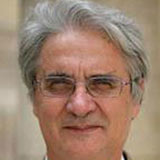 Pierre Briant, the College de France
Pierre Briant, the College de France
Briant is the leading figure in the study of Achaemenid Persian History and has written widely on the Persian empire both from the point of view of Greek and Persian history. He taught in Toulouse for many years before being appointed Professor at the College de France in Paris, where he is the Chair in the History and Civilization of the Persian empire and of the empire of Alexander the Great. He was the Founder of the influentialachemenet.net online resource for Persian history and archaeology. He received a doctorate honoris causa from the University of Chicago in 1999 and is the author of ten monographs, including the standard history of the Persian empire, and more than 100 articles. Listen to lecture (audio hosted by iTunes. Link at the end of the listings).
2010 “Natural Resources and the Institutions of Governance: Evidence from the Ancient and Modern Worlds”
Stephen Haber, Stanford University
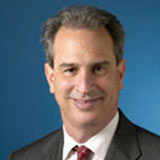
Haber is A. A. and Jeanne Welch Milligan Professor in the School of Humanities and Sciences, Stanford University. Professor of
Political Science, History and Economics (by courtesy). He is also the Peter and Helen Bing Senior Fellow at the Hoover Institution; senior fellow of the Stanford Institute for Economic Policy Research; senior fellow of the Center for International Development; and research economist at the National Bureau of Economic Research.
His research focuses on the relationship between political organization and economic growth.Most of this research has focused on Latin America, particularly Mexico and Brazil. But through the Social Science History Institute (SSHI) at Stanford, Steve has
been one of the strongest supporters of Ancient History in the US over the last 15 years. In particular the SSHI has been instrumental in several important international conferences about the Ancient Economy.
2009 “What is Ancient History?”
 Ian Morris, Stanford University
Ian Morris, Stanford University
Morris is Jean and Rebecca Willard Professor in Classics and Professor in History at Stanford University. He began his career as an archaeologist and historian of ancient Greece, studying early texts and excavating sites around the Mediterranean Sea, but in recent years he has moved toward larger-scale questions and an evolutionary approach to world history. He has written or edited eleven books, among which are Archaeology as Cultural History: Words and Things in Iron Age Greece (Wiley-Blackwell, 2000). From 2000 through
2006 Professor Morris directed Stanford University’s excavation at Monte Polizzo, a native Sicilian town of the seventh and sixth centuries BC. His most recent book, Why the West Rules …For Now (Farrar, Strauss and Giroux, forthcoming 2010), asks how geography and natural resources have shaped the distribution of wealth and power around the world across the last 20,000 years and how they will shape our future. Morris’s ongoing projects include a book on slavery and globalization, a study of western civilization co-authored with historian Niall Ferguson of Harvard University, and a volume of the forthcoming Cambridge History of the World.
2008 Romans in the Middle: Between Class, Status and Geography
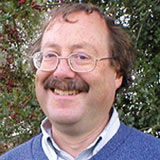 Nicholas Purcell, Oxford University
Nicholas Purcell, Oxford University
Purcell is a fellow of St. John’s College and CUF Lecturer in Ancient History in the Faculty of Classics, Oxford University. He was elected a Fellow of the British Academy in 2007. Mr. Purcell is an expert on the ancient Mediterranean and is perhaps best known for his monumental study, The Corrupting Sea: A Study of Mediterranean History, co-authored with Peregrine Hordern (Oxford University Press, 2000). In his work he uses archaeological evidence alongside literary and documentary evidence to explore the social, economic and cultural history of the Greeks and Romans and their neighbors. His work especially stresses the longues durées, blending archaeological findings with other data, and insisting that the different themes of history, such as culture, politics, societies, economic behavior, ideas, institutions, must be studied in close association.
Purcell has a special interest in the ancient city of Rome and its Italian setting; in the cultural significance of games of chance, the rôle of women in the Roman imperial family, landscape gardening, and the emperor’s resemblance to an actor on the stage; and in the production and consumption of wine and the socio-economic significance of the villa.